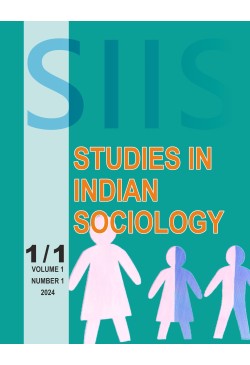
Studies in Indian Sociology
Frequency :Bi-Annual
ISSN :2584-2099
Peer Reviewed Journal
Traditional Medicinal Practices and Practitioners of the Tai Khamtis of Narayanpur, Assam
The Tai Khamtis have inherited traditional medicinal knowledge passed over generations. People from faraway places visit the Khamti healers for certain cures. This valuable ancient knowledge is based on the use of locally available resources and cost – effective and natural skills. The present study observes the different techniques and methods of treatment in Khamti medicine as well as the role of the traditional practitioners of Khamti medicine.
This traditional medicinal knowledge is an integral part of the Tai Khamti community. Over the years, varied factors have influenced the overall functioning of the traditional medicinal system. The study tries to understand this nature of changes in the system and the major factors responsible for such deviations.
Keywords: Traditional Medicine; Tai Khamti; Local Healing System; Tribal Medicine and Change
Parishmita Saikia (2024). Traditional Medicinal Practices and Practitioners of the Tai Khamtis of Narayanpur, Assam. Studies in Indian Sociology, 1: 1, pp. 1-9.
Relevance of ‘Time Use Research in the Social Sciences’ in the Era of SDGs
Method is an essential part of any kind of scientific study. We are presently in the era of Sustainable Development Goals (SDGs), it have 17 goals with 169 targets. It is a time-bound global development agenda is to be achieve by 2030. India had played a pro-active role to incorporate its own issues in the formation of goals, so India have to play a vital role to implement the issues of the goals and India is doing so. But if we go through the report of India on the issues, then we find the disparities in accumulating the relevant data and its interpretation. This situation the author developed the question of this article, is the ‘Time Use Research in the Social Sciences’ may useful for the investigator of SDGs?
The author as reviewer of the book ‘Time Use Research in the Social Sciences’ edited by Wendy E. Pentland, Andrew S. Harvey, M. Powell Lawton and Mary Ann McColl published by Kluwer Academic Publishers, New York, Boston, Dordrecht, London, Moscow in 2002 is trying to explore the answered of the article to deal the issues of the SDGs in a multicultural and geographically varied population of India.
Keywords: Data; Development; India; SDGs; Time use research
Sanjoy Sarkar (2024). Relevance of ‘Time Use Research in the Social Sciences’ in the Era of SDGs. Studies in Indian Sociology, 1: 1, pp. 11-22.
A Study on Inter-Generational Knowledge Transfer and Its Impact on Sustainable Well-Being
This study examines the inter-generational knowledge transfer within the Malayali tribe in the Kolli Hills of Tamil Nadu, focusing on 15 participants from the villages of Devanur Nadu, Valappur Nadu, and Valavanthi Nadu. The research aims to explore how traditional agricultural and cultural knowledge is passed down through generations and its impact on the sustainable well-being of the community. Data were collected through qualitative interviews and quantitative surveys, with SPSS used for statistical analysis. The findings highlight the critical role of elders in preserving traditional knowledge and the challenges posed by modernization and migration. The study underscores the importance of maintaining this knowledge for sustainable practices and overall community resilience.
Keywords: Inter-generational knowledge transfer, sustainable well-being, traditional knowledge,
C. Seerangan & R. Venkata Ravi (2024). A Study on Inter-Generational Knowledge Transfer and its Impact on Sustainable Well-Being. Studies in Indian Sociology, 1: 1, pp. 23-36.
Understanding Indian Society through Bhakti Literature: A Perspective from Below
It will be very difficult to arrive at the origin of Bhakti because it is a feeling of surrendering to God which is in all religions. But during medieval period, ‘Bhakti’ assumed a new significance and brought many changes in the Indian society. In this period Bhakti saints from different places preached importance of ‘Bhakti’ in their vernacular language instead of Sanskrit with sincere and simple devotion instead of complicated and costly rituals. Their teachings had variations from place to place due to language but their messages had widespread effect on the population. During this period many saints raised their voice against unjustified caste system and caste-based discrimination. This paper depicts the voices of saints like Tiruppan Alvar, Chokhamela and Ravidas of different states and languages in India.
Keywords: Indian Saints, Bhakti literature, Social Stratification, Caste System
Jayashree Ambewadikar (2024). Understanding Indian Society through Bhakti Literature: A Perspective from Below. Studies in Indian Sociology, 1: 1, pp. 37-42.
The Role of Self-Help Groups in Promoting Women Entrepreneurship
The Self-Help Groups (SHGs) have been empowering women socially and economically and also encouraged them to create their own enterprises. SHG membership improves money management, confidence, decision-making, and social networks. They also organize local collaboration. People establish social capital and support networks via SHGs. The research examines SHG membership and social and economic development using secondary qualitative analysis. The paper also discusses issues including tool availability, community support, and leadership. SHG stakeholders should be engaged to develop gender-sensitive regulations, and promote relationships to help initiatives to operate better and endure longer results. The research also recommends investing more in women’s SHGs and business control to enhance women’s livelihoods. Focusing on SHG development may assist leaders, NGOs, and community organisations to make society more open and equitable for women. This will equip women for personal and professional success. The research shows how SHGs has empowered women and boost socio- economic development.
Keywords: Self-Help Groups (SHGs), Women entrepreneurship, Sustainable Business Model, Socio-economic Empowerment and Gender equality.
Neeraj Kumar and Jayashree Ambewadikar (2024). The Role of Self-Help Groups in Promoting Women Entrepreneurship. Studies in Indian Sociology, 1: 1, pp. 43-51.